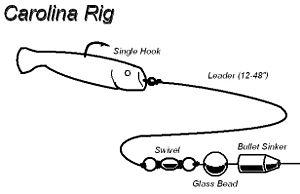Every lake is unique; the results of a great number of long term environmental factors that shape its development and ultimately its fish population. A typical guide for fishermen is that on any lake 90% of the fish are found on 10% of the water. As the seasons pass , fish react due to the natural changes in their environment particularly the level of absorbed oxygen and water temperature. When a fisherman looks at an unfamiliar expanse of water, he sees only a featureless surface. So choosing a fishing location can be tricky because every lake is different, but nature does provide some clues to the observant angler that will improve the chances of choosing a time and a location when the fish will be present and biting.
Experienced fishermen diligently watch what is happening around them looking for these clues to help unravel the mysteries of fish behavior. The seasonal activities of fish often correspond to the blooming of certain plants, bird migrations and other events. As an example, white bass often begin spawning when the dogwood trees start blooming. But this spectacular event may vary as much as 3 weeks from one year to the next based primarily on the timing of S pring and the subsequent change in temperature. So planning a fishing expedition strictly by the calendar will not regularly find white bass on their spawning grounds but waiting for the dogwoods to flower improves the chances of being there at the proper time. Bearing this in mind many anglers keep a logbook of their discoveries to help them on future outings.
Another example is too find hints of the fall turnover in a lake by studying a sudden decline in water clarity. Turnover is the natural way of re-oxygenating the water but it also stirs up the bottom of the lake producing floating waste and drastically increasing turgidity. Oxygen levels will decrease for a short period and the fish typically turn off from feeding and scatter across the lake from surface to bottom. This situation typically lasts from 1-2 weeks, but when the turn is done, oxygen levels rise swiftly and the now hungry fish begin to feed again heralding in some of the finest angling of the year.
Knowledable anglers are always alert for the indicators of fish activity and search for crappies building their nests, large bass or pike feeding in the shallows or small fish dimpling the surface of a quiet bay. Polarized glasses help catch more fish because of their the ability to eliminate glare so that the angler can see under the outer surface of the water and more easily identify these activities.
Whether fishing from a boat, or from the shore or exploring the water with chest waders, there are numerous natural clues which can often be invaluable to all fishermen. The facility to identify and act on these natural events is what distinguishes the great angler from the average one and nearly always leads to catching more fish.
Experienced fishermen diligently watch what is happening around them looking for these clues to help unravel the mysteries of fish behavior. The seasonal activities of fish often correspond to the blooming of certain plants, bird migrations and other events. As an example, white bass often begin spawning when the dogwood trees start blooming. But this spectacular event may vary as much as 3 weeks from one year to the next based primarily on the timing of S pring and the subsequent change in temperature. So planning a fishing expedition strictly by the calendar will not regularly find white bass on their spawning grounds but waiting for the dogwoods to flower improves the chances of being there at the proper time. Bearing this in mind many anglers keep a logbook of their discoveries to help them on future outings.
Another example is too find hints of the fall turnover in a lake by studying a sudden decline in water clarity. Turnover is the natural way of re-oxygenating the water but it also stirs up the bottom of the lake producing floating waste and drastically increasing turgidity. Oxygen levels will decrease for a short period and the fish typically turn off from feeding and scatter across the lake from surface to bottom. This situation typically lasts from 1-2 weeks, but when the turn is done, oxygen levels rise swiftly and the now hungry fish begin to feed again heralding in some of the finest angling of the year.
Knowledable anglers are always alert for the indicators of fish activity and search for crappies building their nests, large bass or pike feeding in the shallows or small fish dimpling the surface of a quiet bay. Polarized glasses help catch more fish because of their the ability to eliminate glare so that the angler can see under the outer surface of the water and more easily identify these activities.
Whether fishing from a boat, or from the shore or exploring the water with chest waders, there are numerous natural clues which can often be invaluable to all fishermen. The facility to identify and act on these natural events is what distinguishes the great angler from the average one and nearly always leads to catching more fish.
About the Author:
Click on the following links to learn how to catch more fish by using Redington Waders and Wader Boots

